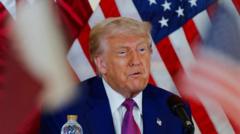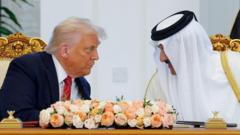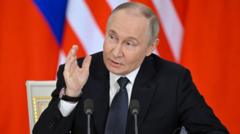The recent meeting between Donald Trump and Syrian interim President Ahmed al-Sharaa in Riyadh marks a significant shift in U.S. foreign policy towards Syria. Trump's acknowledgment of potential normalization and the lifting of sanctions offers renewed hope for Syrians suffering from the ongoing civil unrest, while also highlighting the complexity of achieving lasting diplomatic relationships.
Unexpected Diplomatic Shift: Trump Engages with Syrian Leadership

Unexpected Diplomatic Shift: Trump Engages with Syrian Leadership
In an unprecedented diplomatic move, Donald Trump meets Syria's interim President Ahmed al-Sharaa, raising hopes for a new era of U.S.-Syria relations.
Donald Trump has recently expressed openness to normalizing relations with Syria following a notable meeting with Ahmed al-Sharaa, the nation's interim president, in Riyadh. Just months ago, a meeting between U.S. and Syrian officials would have been deemed highly improbable, making this encounter particularly striking.
The 37-minute discussion took place in a lavish Saudi royal palace and included the attendance of prominent figures such as Saudi Crown Prince Mohammad bin Salman and Turkish President Recep Tayyip Erdogan, who joined via telephone. Trump's comments, including praise for al-Sharaa's potential and a sudden decision to lift U.S. sanctions, were met with strong approval at a major investment forum.
This meeting, however, comes with layers of complexity. Al-Sharaa has a controversial background linked to al-Qaeda and has only recently shed ties with the Islamist faction Hayat Tahrir al-Sham (HTS), which continues to be classified as a terrorist organization by several nations. For his part, al-Sharaa is attempting to portray a new and unifying image as President, with calls for the lifting of sanctions encapsulating hope for many Syrians.
Hind Kabawat, a minister in the interim government, expressed optimism, pointing to this new opportunity as a potential light at the end of an arduous tunnel for a nation battered by more than ten years of war and economic hardship. The lifting of sanctions may facilitate increased humanitarian aid and potentially reverse the dire living conditions faced by a vast majority of Syrians, many of whom currently do not have adequate access to basic necessities.
Despite the hopeful atmosphere, experts warn that the complete removal of sanctions will not be straightforward. Immediate action may be possible through presidential waivers, but the multifaceted nature of existing sanctions demands a sustained commitment from the Trump administration. Observers note that normalizing relations with Syria expects reciprocation, specifically in regards to the Abraham Accords—a U.S.-led initiative aimed at fostering agreements between Israel and various Arab nations, to which al-Sharaa has shown willingness to collaborate under certain conditions.
Israeli Prime Minister Benjamin Netanyahu’s concerns regarding the continuance of foreign fighters in Syria and al-Sharaa's ties with HTS remain significant challenges in the path to normalization. Amidst this delicate backdrop, Trump's optimistic pronouncement of a ‘chance at greatness’ resonates with millions of Syrians yearning for a real improvement in their lives, underscoring the intricate balancing act required for a meaningful diplomatic resolution.




















